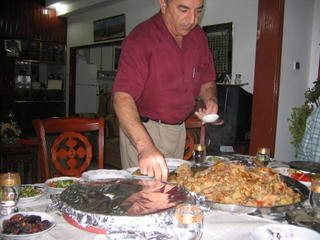Iftar

As a non-Muslim living in the Muslim world, I never really felt left out until Ramadan this year. I figure it’s kind of like being Jewish or Muslim in the United States during Christmas. I certainly don’t envy the fasting part of the holy month – from sunrise to sundown, Muslims refrain from eating, drinking and smoking – but I am jealous of the big dinners that everyone hurries home to eat at sunset. I’m reminded of this everyday, as shops close and the streets empty in the late afternoon. Luckily, I’ve been invited to two iftar dinners in Muslim homes, and another at a restaurant.
On Saturday, I went with three colleagues to our Arabic professor’s home in Salfit, an hour north of Ramallah. It’s situated in a valley surrounded by terraced olive groves (and one of the largest Jewish settlements in the West Bank, Ariel). Sameer gave us a tour of the city and then we listened to his 78-year-old mother recount, in her distinctive peasant dialect, memories of the British occupation in the 1930s and 40s. He lives with his wife and four children in a house that is built above the house of one of his brothers. Other family members live in adjacent houses, which is a typical arrangement in Palestine and elsewhere in the Arab World.
At 5 p.m., we sat around the dining table and listened for the call to prayer, as steam rose from the food, heaped in two large serving trays in the center of the table, and from chicken noodle soup, sitting in bowls before us. Through the open door, we heard, “Allah Akbar!” from the nearest mosque, which was permission to eat. First, following a tradition attributed to the prophet Mohammad, we each ate a dried date. Then, the soup. Then, a traditional Palestinian dish called maqloubah, which means “upside down.” The name has something to do with the way the dish is prepared, which I’ve never quite understood, but I’ve had it before and it’s one of my favorites: Sticky rice with chicken, cauliflower and eggplant, all cooked together. We also ate kofta, which is similar to meat balls, with baked tomatoes. And a salad of diced cucumber, tomato and lettuce. And yogurt on the side. The nice thing about Ramadan is that it’s completely acceptable to eat obscene amounts of food. (Some Muslims actually gain weight during Ramadan.) So, I helped myself to three servings of maqlouba and two servings of kofta.
Just as we were finishing, Sameer’s oldest son, Mohammad, returned from university classes at Al-Najah University in Nablus. Luckily, there was some food left for him. The 15-mile trip took three hours, which has been typical the past week, Mohammad told us. Israeli soldiers stopped all traffic on the only road leading south from Nablus. They took all the identification cards of the passengers in the van in which he was riding and held them for more than two hours. After sundown, they returned the ID cards and reopened the road to traffic. Palestinians say Israelis set up blockades late in the day during the month of Ramadan merely to delay Palestinians’ return home to their families. Israelis say Palestinians take advantage of Ramadan to smuggle weapons through the West Bank. (I encountered one such checkpoint returning to Ramallah from Birzeit late one afternoon last week.)
After dinner, we moved to the living room and ate more dried dates, drank Arabic coffee and finished with kanafeh, the sweet goat cheese desert. (I told myself that I really need to fit kanafeh into my daily routine. It is too good not to eat on a regular basis.) Then, we toured the town again, visited various friends and relatives of Sameer, and despite more rounds of coffee, we all became very sleepy, not unlike the effects of a Thanksgiving dinner in America.

0 Comments:
Post a Comment
<< Home